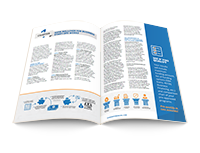Bookkeeping Basics
What Is the Difference Between Bookkeeping and Accounting?

Bookkeeping and accounting are often spoken of together, but they’re not exactly the same thing.
Bookkeeping is the process of tracking every financial transactions in a small business and creating a record of them. The records can include invoices, bills, ledgers, account books, paychecks, software displays, spreadsheets, and more. The bookkeeping process becomes the beginning part of accounting.
Accounting is the process of using the financial data created by bookkeeping to create reports and take further actions. Accountants gather the records of the transactions that bookkeeping generates and maintains. With these, accountants create various financial reports over time, such as monthly, quarterly, and annual reports. They generate financial statements such as income statements and balance sheets. Using bookkeeping records, accountants also plan and calculate tax payments.
There’s also a difference in the qualifications of the people doing each function. Bookkeepers must be organized and meticulous in keeping records and know basic bookkeeping concepts. However, they don’t necessarily need specialized training or qualifications. Accountants often have accounting degrees, certifications, and special training.
Why Is Bookkeeping Important for Small Businesses?
Bookkeeping is one of the most crucial functions of a successful small business. Strategic planning or innovative marketing may be more glamorous and necessary to long-term business growth, but bookkeeping ensures successful financial position — and without that, your small business may not continue to exist at all.
Bookkeeping lets you see whether you are making a profit and how much profit you’ve made in a given period. It allows you to see whether your customers are paying you in a timely way, and if they aren’t, you can see which customers need a follow-up reminder. Bookkeeping ensures that you pay your vendors and suppliers on time; failure to do so could expose you to late payment charges — and make important vendors and suppliers reluctant to deal with your business in the future.
Bookkeeping ensures that your employees and contractors are paid correctly, that their taxes and other withholdings are booked in your financial system correctly, and that you have the funds to pay taxes and other obligations.
Those are the some of the everyday functions of bookkeeping which are essential to your long-term strategy. Bookkeeping provides key data to you as a business owner. It can be used, for example, to track whether specific periods are more profitable than others. It can give you snapshots of your financial status that you can use to make important decisions about nearly every aspect of the business, from product lines to suppliers to upcoming marketing campaigns.
Ultimately, bookkeeping can provide the data to determine whether product line expansion or physical growth is justifiable financially and can reasonably be expected to pay for itself.
Successful bookkeeping also saves you from the potential negative consequences of inadequate financial management. Sometimes, fledgling small business owners put off instituting good management of their bookkeeping. They may keep receipts or even payments in a desk drawer until they get around to filing or cashing them.
Believe us, that’s a potential recipe for disaster. All too quickly, you can get behind on bookkeeping and not know your financial situation. You may overdraw business bank accounts or even miss payroll if your records, receipts, and payments aren’t kept up to date.
Inadequate bookkeeping can also make preparing and submitting your taxes far more laborious than it should be. Sifting through records to find out your income and other relevant data takes considerable time and effort.
Long-term, inadequate bookkeeping can lead to IRS or State government tax, and even U.S. Department of Labor fines and penalties. These can harm your cash flow and profit margins, especially if your business is a startup. The fines and penalties can be steep, and they also incur interest over time. Good bookkeeping practices keep fines and penalties away from your door and can streamline the preparation and payment of business taxes.
Common Bookkeeping Methods
Cash Basis
With cash basis accounting, each transaction is recorded when payments for transactions are actually made. For example, the business records revenue when clients pay, rather than when you invoice clients. Similarly, the payment of your business’s bills isn’t recorded until you actually pay them.
Cash basis accounting means that you have an immediate picture of your cash flow on hand. It’s particularly useful for startup businesses, sole proprietorships and cash-based businesses that don’t have timing difference between time of sales and collection of payments, such as small restaurants.
Accrual Basis
In accrual basis accounting, your business records revenue as it is earned, rather than when payment is collected. Similarly, the expenses are recorded when you receive the vendor bill, rather than when you pay the vendor. In other words, accrual basis accounting tracks your business’s revenue and expenses the moment you incur them.
If you use an accrual basis, you are more likely to have accounts receivable (money customers owe your business for products or services) and accounts payable (money your business owes to suppliers, creditors, or vendors).
Accrual basis accounting ultimately gives a more accurate financial picture of your income and expenses over time than cash basis accounting does. It’s used by almost all larger and more complex businesses.
Pre-Qualify Today!










